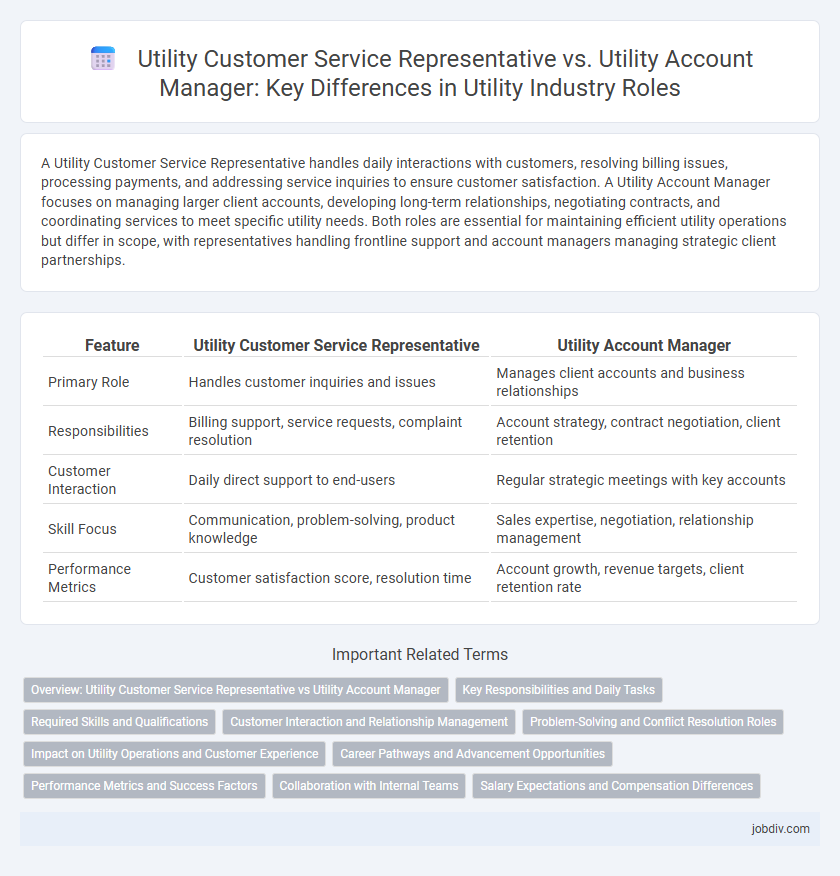A Utility Customer Service Representative handles daily interactions with customers, resolving billing issues, processing payments, and addressing service inquiries to ensure customer satisfaction. A Utility Account Manager focuses on managing larger client accounts, developing long-term relationships, negotiating contracts, and coordinating services to meet specific utility needs. Both roles are essential for maintaining efficient utility operations but differ in scope, with representatives handling frontline support and account managers managing strategic client partnerships.
Table of Comparison
| Feature | Utility Customer Service Representative | Utility Account Manager |
|---|---|---|
| Primary Role | Handles customer inquiries and issues | Manages client accounts and business relationships |
| Responsibilities | Billing support, service requests, complaint resolution | Account strategy, contract negotiation, client retention |
| Customer Interaction | Daily direct support to end-users | Regular strategic meetings with key accounts |
| Skill Focus | Communication, problem-solving, product knowledge | Sales expertise, negotiation, relationship management |
| Performance Metrics | Customer satisfaction score, resolution time | Account growth, revenue targets, client retention rate |
Overview: Utility Customer Service Representative vs Utility Account Manager
Utility Customer Service Representatives primarily handle day-to-day interactions with customers, addressing inquiries, resolving billing issues, and providing information about utility services. Utility Account Managers focus on managing customer accounts strategically, overseeing contract negotiations, ensuring compliance with regulations, and maintaining long-term client relationships. Both roles are essential for optimizing customer satisfaction and operational efficiency within utility companies.
Key Responsibilities and Daily Tasks
Utility Customer Service Representatives handle direct client interactions, resolving billing issues, processing payments, and addressing service inquiries to ensure customer satisfaction. Utility Account Managers oversee client accounts by managing contracts, coordinating service delivery, and developing customized utility solutions to optimize account performance. Both roles require strong communication skills, with representatives focused on frontline support and account managers driving strategic client relationship management.
Required Skills and Qualifications
Utility Customer Service Representatives require strong communication skills, problem-solving abilities, and proficiency in handling customer inquiries and complaints, often needing knowledge of billing systems and customer relationship management (CRM) software. Utility Account Managers must possess advanced skills in account management, data analysis, and project coordination, along with expertise in contract negotiation and regulatory compliance within the utility sector. Both roles typically require a high school diploma or equivalent, with Account Managers often needing a bachelor's degree in business, finance, or a related field to effectively manage client portfolios and utility service agreements.
Customer Interaction and Relationship Management
Utility Customer Service Representatives handle direct, day-to-day customer interactions by addressing inquiries, resolving billing issues, and providing service support to ensure customer satisfaction. Utility Account Managers focus on long-term relationship management through strategic communication, personalized service plans, and proactive problem-solving to enhance customer loyalty and retention. Both roles require strong communication skills, but Account Managers emphasize building and maintaining lasting client relationships, while Customer Service Representatives prioritize immediate service and issue resolution.
Problem-Solving and Conflict Resolution Roles
Utility Customer Service Representatives primarily handle frontline problem-solving by addressing billing inquiries, service disruptions, and general customer concerns promptly to maintain customer satisfaction. Utility Account Managers focus on conflict resolution by managing complex client accounts, negotiating payment plans, and coordinating with internal departments to resolve escalated issues effectively. Both roles require strong communication skills, but Account Managers typically engage in strategic problem-solving to retain high-value clients and ensure regulatory compliance.
Impact on Utility Operations and Customer Experience
Utility Customer Service Representatives directly interact with customers to resolve billing issues, service inquiries, and outage reports, significantly enhancing real-time customer satisfaction and operational efficiency. Utility Account Managers oversee large client portfolios, coordinating service delivery and long-term account strategies that improve customer retention and optimize resource allocation. Both roles are critical to utility operations, with customer service representatives ensuring immediate issue resolution and account managers driving strategic account growth and operational stability.
Career Pathways and Advancement Opportunities
Utility Customer Service Representatives often serve as the entry point in the utility industry, handling customer inquiries and billing issues while gaining frontline experience critical for career growth. Advancement opportunities typically lead to roles such as Utility Account Manager, where professionals manage client portfolios, develop strategic relationships, and oversee account performance within utility companies. Progression from Customer Service Representative to Account Manager often involves acquiring specialized knowledge in utility regulations, project management skills, and demonstrating a strong track record in customer satisfaction.
Performance Metrics and Success Factors
Utility Customer Service Representatives are primarily evaluated on metrics such as call resolution time, customer satisfaction scores, and first-contact resolution rates, emphasizing responsiveness and effective problem-solving. Utility Account Managers focus on performance indicators like customer retention rates, revenue growth, and successful upselling or cross-selling efforts, highlighting relationship management and long-term client satisfaction. Success factors for representatives include strong communication skills and technical knowledge, whereas account managers excel through strategic account planning and proactive customer engagement.
Collaboration with Internal Teams
Utility Customer Service Representatives facilitate communication between customers and internal departments by quickly addressing service issues and relaying accurate information. Utility Account Managers coordinate with billing, operations, and technical teams to ensure seamless account management and resolve complex customer inquiries. Both roles require strong collaboration skills to optimize customer satisfaction and operational efficiency within utility companies.
Salary Expectations and Compensation Differences
Utility Customer Service Representatives typically earn between $35,000 and $50,000 annually, reflecting their focus on direct customer interaction and issue resolution. In contrast, Utility Account Managers command higher salaries, often ranging from $55,000 to $75,000, due to their responsibilities for managing client accounts and driving revenue growth. Compensation packages for Account Managers frequently include performance bonuses and commission incentives, enhancing their total earnings beyond base salary.
Utility Customer Service Representative vs Utility Account Manager Infographic

 jobdiv.com
jobdiv.com